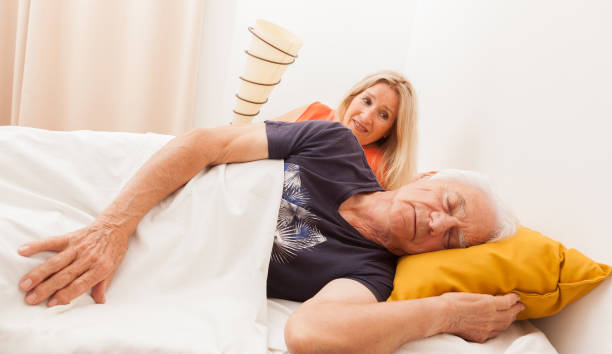Introduction

Parkinson's disease and sleep apnea are two distinct medical conditions that can significantly impact a person's health and well-being. While they may appear unrelated, recent research has uncovered a connection between these two conditions. This article will explore the link between Parkinson's disease and sleep apnea, understand how they can influence each other, and discuss potential treatment options to manage both conditions effectively.
What is Parkinson's Disease?
Parkinson's disease is a condition that impacts the motor system and arises from the degeneration of cells that produce dopamine in the brain. The symptoms may consist of tremors, stiffness, and problems with coordination and balance, which occur because of an insufficiency of dopamine that regulates smooth movement control.
What is Sleep Apnea?
Sleep apnea is a disorder that affects sleep and causes temporary interruptions in breathing. These interruptions can occur multiple times at night and last for several seconds or minutes. Usually, this happens because the airway is obstructed. Consequently, sleep quality is affected, and the body may not receive enough oxygen.
The Link Between Parkinson's Disease and Sleep Apnea

Individuals with Parkinson's disease have a higher likelihood of developing sleep apnea compared to the general population, according to recent studies. The connection between the two conditions can be attributed to various factors.
Understanding the Connection
Shared Risk Factors: Both Parkinson's disease and sleep apnea share some common risk factors, such as age and obesity. These factors contribute to the developing of both conditions, making individuals with Parkinson's disease more susceptible to sleep apnea.
Impact on Sleep Quality:
Parkinson's disease can cause sleep disturbances, including insomnia, restless leg syndrome, and rapid eye movement (REM) sleep behavior disorder. These disruptions can increase the likelihood of developing sleep apnea or exacerbate symptoms.
Interaction of Symptoms:
Parkinson's disease symptoms, such as muscle rigidity and tremors, can affect the muscles involved in breathing, leading to breathing difficulties during sleep. The mentioned factor may impact improving or worsening sleep apnea symptoms.
Diagnosing Parkinson's Disease and Sleep Apnea
Early and accurate diagnosis of Parkinson's disease and sleep apnea is crucial for effective management.
-
Parkinson's Disease Diagnosis: Parkinson's disease is typically diagnosed based on a person's medical history, a physical examination, and specific motor symptoms. Additional tests, such as brain imaging and dopamine transporter scans, may be used to confirm the diagnosis.
-
Sleep Apnea Diagnosis: Sleep apnea is typically diagnosed using a sleep study called polysomnography. This examination evaluates different factors during sleep, such as breathing patterns, brain activity, and oxygen levels. By analyzing these measurements, healthcare professionals can determine whether sleep apnea is present and evaluate its severity.
Treatment Options
Parkinson's Disease Treatment:

The primary objective in treating Parkinson's disease is to effectively manage symptoms and slow down the condition's advancement. Treatment methods typically encompass a combination of medication, physical therapy, and adjustments to one's lifestyle. In certain instances, the option of deep brain stimulation surgery might be suggested as well.
Sleep Apnea Treatment:
The main objective in treating sleep apnea is to improve breathing during sleep and reduce disruptions in the sleep cycle. The most commonly used method to achieve this is a therapy known as continuous positive airway pressure (CPAP). CPAP entails wearing a mask that delivers air at a controlled pressure, keeping the airway unobstructed and open.
In addition to CPAP therapy, alternative options are available for managing sleep apnea, including using oral appliances, positional therapy, and making lifestyle changes.
Integrated Approach:
As both conditions can influence each other, an integrated approach that addresses Parkinson's disease and sleep apnea is crucial. This may involve collaborating with healthcare professionals from different specialties to develop a comprehensive treatment plan tailored to the individual's needs.
Increased Risk of Parkinson's Disease in Patients With Obstructive Sleep Apnea
During sleep, obstructive sleep apnea (OSA) is a severe medical condition resulting in frequent breathing pauses. The airway narrows or collapses, leading to pauses in breathing. This can lead to excessive daytime sleepiness, brittle mood, and increased risk of cardiovascular diseases and stroke.
Recent studies indicate that obstructive sleep apnea (OSA) might be associated with Parkinson's Disease (PD). The evidence shows that having OSA may increase the likelihood of developing PD, although the precise connection between the two conditions is not fully understood.
Individuals with sleep apnea are more than twice as likely to develop Parkinson's disease than those without it, according to a study of over 1 million people. Additionally, people with severe sleep apnea have a higher risk of developing Parkinson's disease than those with mild sleep apnea.
According to a study, individuals with sleep apnea are more than twice as likely to be diagnosed with Parkinson's disease compared to those who do not have sleep apnea. The study examined over 1 million people. Additionally, individuals with severe sleep apnea have a greater risk of developing Parkinson's disease than those with mild sleep apnea.
The connection between OSA and Parkinson's Disease is complex and still being explored. However, people with OSA risk developing PD more than those without the condition. Therefore, individuals with OSA must be evaluated for PD and receive appropriate treatment if necessary. Treating OSA through lifestyle changes, positive airway pressure therapy or oral appliance therapy can lower the risk of developing Parkinson's Disease.
Please note that more research is necessary to fully comprehend the relationship between obstructive sleep apnea and Parkinson's Disease. In the meantime, people with OSA should consult their doctor about their susceptibility to PD and take steps to decrease that risk.
Explain the symptoms of Parkinson's disease.
There are some common symptoms associated with Parkinson's disease. They include tremors, muscle stiffness, slowed movement, impaired balance and coordination, difficulty speaking or swallowing, fatigue, and changes in facial expressions. Tremors are usually the first symptom to appear and may be mild but worsen over time.
Muscle stiffness can cause decreased flexibility in the joints, making moving difficult. Slowed movement and impaired balance can make everyday tasks more difficult. Difficulty speaking or swallowing is a common symptom of Parkinson's disease, caused by weakened vocal cords and throat muscles. Fatigue is also a frequent complaint and changes in facial expressions due to abnormal muscle movements.
Parkinson's disease is linked to sleep apnea, characterized by interrupted breathing during sleep caused by upper airway obstruction. This is in addition to the symptoms mentioned earlier. This can cause disrupted sleep patterns, fatigue, daytime drowsiness, and headaches. In people with Parkinson's disease, sleep apnea can be caused by weakened muscles in the throat and airway due to the disease.
Treatment for sleep apnea can help improve symptoms associated with Parkinson's disease, such as daytime drowsiness, fatigue, and difficulty speaking or swallowing. Thus, it is important to know the connection between Parkinson's disease and sleep apnea when looking for treatments and managing the condition.
Why does Parkinson's cause sleep problems?
The symptoms of Parkinson's disease include tremors, muscle stiffness, and difficulties with movement due to neurological issues. The exact cause of Parkinson's is not fully understood, but it is believed to be influenced by genetic factors, environmental triggers, and other underlying medical conditions. Individuals with Parkinson's commonly encounter sleep-related issues, including insomnia (difficulty falling asleep) and excessive daytime sleepiness (feeling excessively tired during the day).
Research has shown that sleep disturbances are strongly connected to Parkinson's disease and may be related to decreased levels of the neurotransmitter dopamine, which is responsible for controlling movement in the body. Low dopamine levels can lead to poor motor control and increased difficulty with alertness and wakefulness. Some studies have also suggested that Parkinson's-causing proteins may play a role in sleep disturbances.
Can Parkinson's disease cause central sleep apnea?
People with Parkinson's can experience central sleep apnea, affecting up to 70% of those with the condition. During sleep, irregular signaling between the respiratory muscles and the brain can cause sleep apnea, leading to breathing pauses, disrupted sleep, and daytime fatigue.
Individuals with Parkinson's disease may experience central sleep apnea because of decreased dopamine production in the brain. Dopamine controls movement and sends signals to respiratory muscles to regulate breathing. A lack of dopamine means that these signals are not sent, resulting in pauses in breathing. Additionally, some medications used to treat Parkinson's can contribute to central sleep apnea episodes.
Managing symptoms and medications to address the underlying cause and reduce apnea episodes is crucial to treat central sleep apnea and to enhance the quality of life for people with Parkinson's disease. In addition, avoiding alcohol and sleeping on your side or stomach instead of your back can also decrease the risk of apnea. CPAP machines are commonly used in Parkinson's disease patients with sleep apnea to improve breathing during sleep.
FAQ's
Why does Parkinson's cause sleep problems?
Parkinson's disease is a condition that impacts the nervous system and leads to tremors, stiffness in muscles, and difficulty in movement. Although the precise cause of this condition remains unclear, genetics, environment, and other medical conditions may play a role. Parkinson's patients can experience sleep disorders such as insomnia and daytime sleepiness.
What deficiency causes Parkinson's?
Low dopamine levels can lead to poor motor control and increased difficulty with alertness and wakefulness. Some studies have also suggested that Parkinson's-causing proteins may play a role in sleep disturbances.
Is Parkinson's worse at night?
Research has shown that sleep disturbances are strongly connected to Parkinson's disease and may be related to decreased levels of the neurotransmitter dopamine. While not everyone experiences more symptoms at night, some people may find their symptoms worsen as the day progresses.
What slows Parkinson's progression?
Although Parkinson's disease does not have a cure, there are available treatments that can assist in slowing its progression. For instance, medications like levodopa and dopamine agonists boost the brain's dopamine levels, reducing symptoms and enhancing motor control. Besides, physical therapy is advantageous for people with Parkinson's disease since it eases coordination, flexibility, and balance. Exercise is also helpful in alleviating stiffness and improving mobility among Parkinson's patients.
How can I improve my sleep with Parkinson's?
Individuals with Parkinson's can enhance their sleep quality through good sleep hygiene, including maintaining a regular sleep routine and avoiding caffeine consumption at night. Additionally, lifestyle modifications like quitting smoking, reducing stress levels, and exercising regularly can help to reduce symptoms of Parkinson's disease and improve overall sleep quality.
Conclusion
In conclusion, sleep disturbances are common in those with Parkinson's disease. Understanding the connection between Parkinson's and sleep apnea can help to identify potential treatment strategies for improving sleep quality. Treating the underlying cause by managing symptoms and medications can reduce episodes of apnea during sleep, while other helpful strategies, such as avoiding alcohol or sleeping on your side, can also help to reduce the risk of apnea episodes. With the help of lifestyle modifications, medications, and physical therapy, individuals with Parkinson's can experience better sleep quality.

